Watch our Executive Director Chris Coulter at the Munich Security Conference!
Watch our Executive Director at #MSC2026!
Our Library
Explore our publications, from research papers and series to educational materials, covering all aspects of conflict transformation and peace promotion.
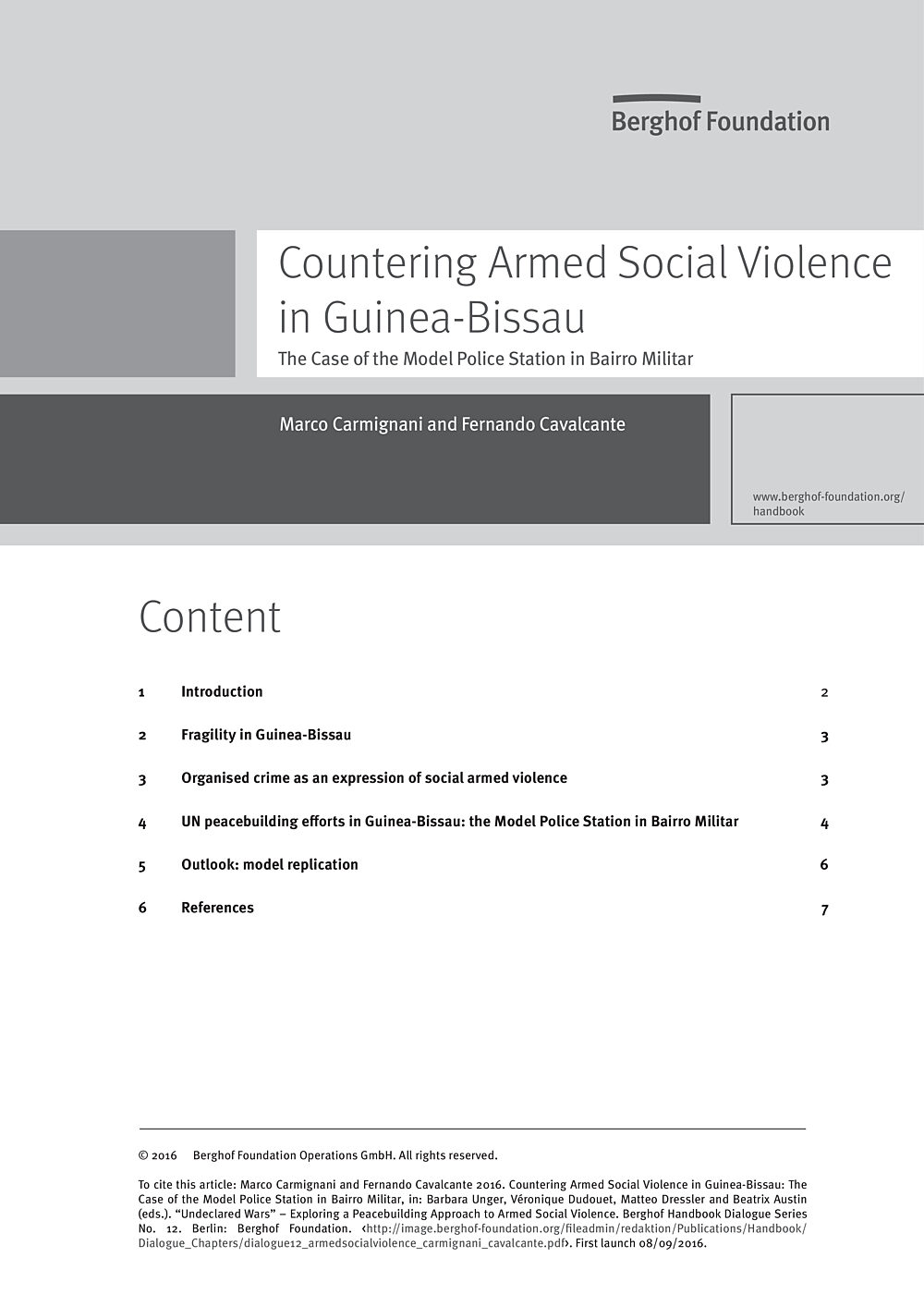
Countering Armed Social Violence in Guinea-Bissau: The Case of the Model Police StationBerghof Handbook Dialogue Series No. 12 - comment
Our response explores the application of these participatory and community-informed approaches in the context of Guinea-Bissau, where a community-based policing model, the Model Police Stations (MPS), had its genesis in participatory research. Participatory research has also informed activities in other areas,such as the prevention of gender violence. In 2011, for example, a comprehensive portrayal of the violence against women in the country resulted from the combination of quantitative data with qualitative research on perceptions (see Roque 2011).
- Year2016
- Author(s)Marco Carmignani, Fernando Cavalcante
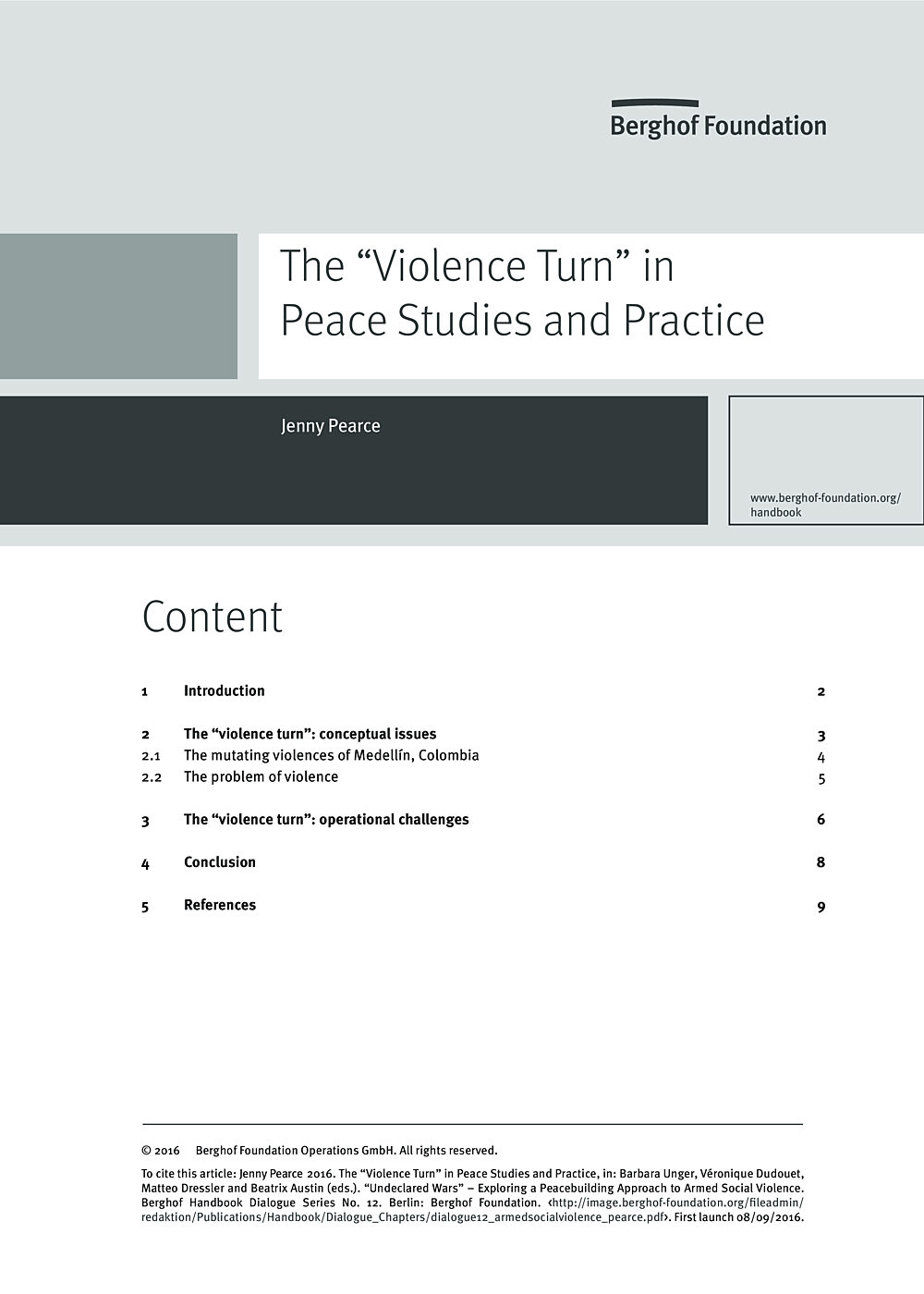
The “Violence Turn” in Peace Studies and PracticeBerghof Handbook Dialogue Series No. 12 - comment
Bernardo Arévalo de León and Ana Glenda Tager have written a succinct and substantive article, which adds to evidence of a shift from the centrality of war and conflict (armed and non-armed) in the study and practice of peace, towards a focus on violence, or rather that aspect of violence the authors call “armed social violence”. Violence, I argue, is the opposite of peace and this step towards recognising the wider expressions of violence is to be greatly welcomed. Violence is extensively studied, but in disciplinary silos. We lack a “converter” to enable us to interpret the learning from these various silos and to help us build new understandings of the varied mechanisms of violence reproduction and reduction. Despite nods to interdisciplinarity, academia reinforces the silos, while practice cannot easily embrace the complexity within and between each.
- Year2016
- Author(s)Jenny Pearce
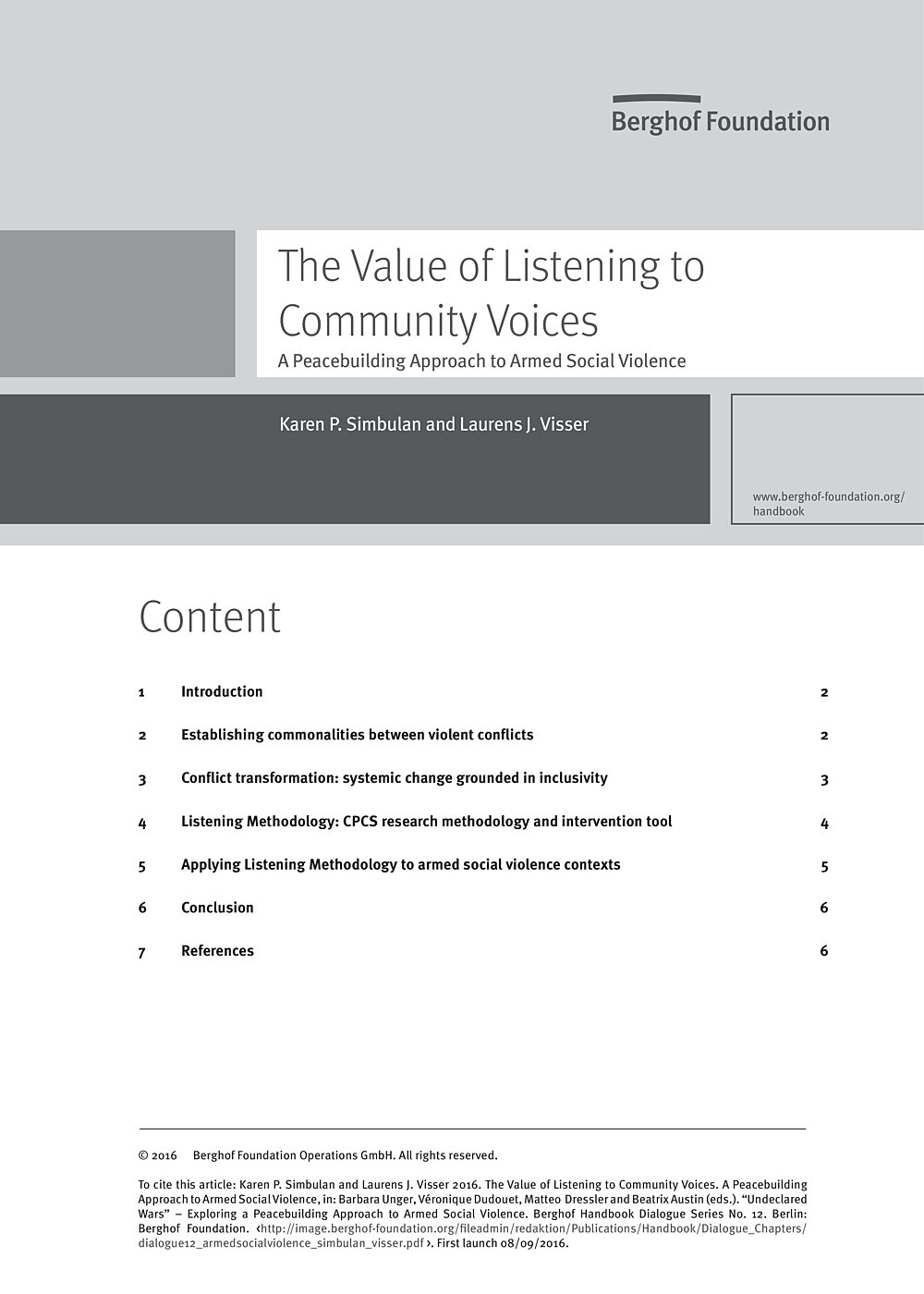
The Value of Listening to Community Voices. A Peacebuilding Approach to Armed Social ViolenceBerghof Handbook Dialogue Series No. 12 - comment
We respond to the lead article from the point of view of conflict transformation practitioners from the Centre for Peace and Conflict Studies (CPCS), a non-governmental organisation based in Siem Reap, Cambodia, which focuses on strengthening and supporting the peace processes in the Philippines and Myanmar and peacebuilding efforts in Sri Lanka. We thus operate within contexts involving state and non-state armed groups engaging or previously engaged in political conflict, and any exposure we have to armed social violence emerges from this context.
- Year2016
- Author(s)Karen P. Simbulan, Laurens J. Visser
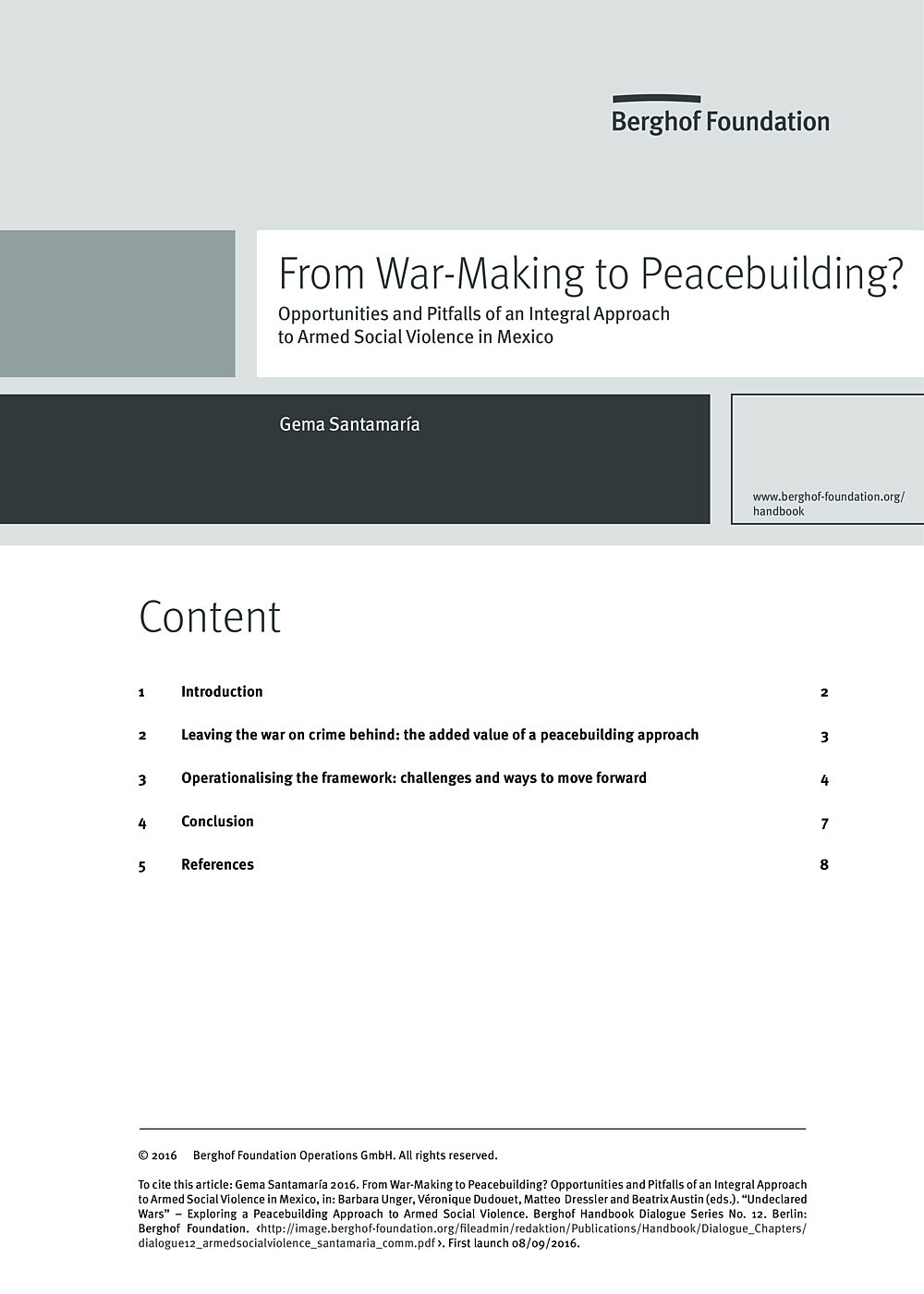
From War-Making to Peacebuilding? Opportunities and Pitfalls of an Integral Approach to Armed Social Violence in MexicoBerghof Handbook Dialogue Series No. 12 - comment
The essay by Bernardo Arévalo de León and Ana Glenda Tager constitutes an important and welcome contribution to a much-needed dialogue on alternative ways to address non-conventional armed violence in Latin America. It offers a critical reference point to move away from the militarised and repressive strategies that have been privileged by most Latin American countries, towards an integral approach that aims to create the necessary conditions to build peace in a feasible and sustainable manner (Arévalo de León/Tager 2016, 20-21). The following response is based on my own research dealing with the sociological and historical underpinnings of armed social violence in Mexico and Central America. It also builds on my experience as a practitioner working within a citizen security framework geared towards the adoption of more integral and sustainable approaches to violence in Latin America.
- Year2016
- Author(s)Gema Santamaría
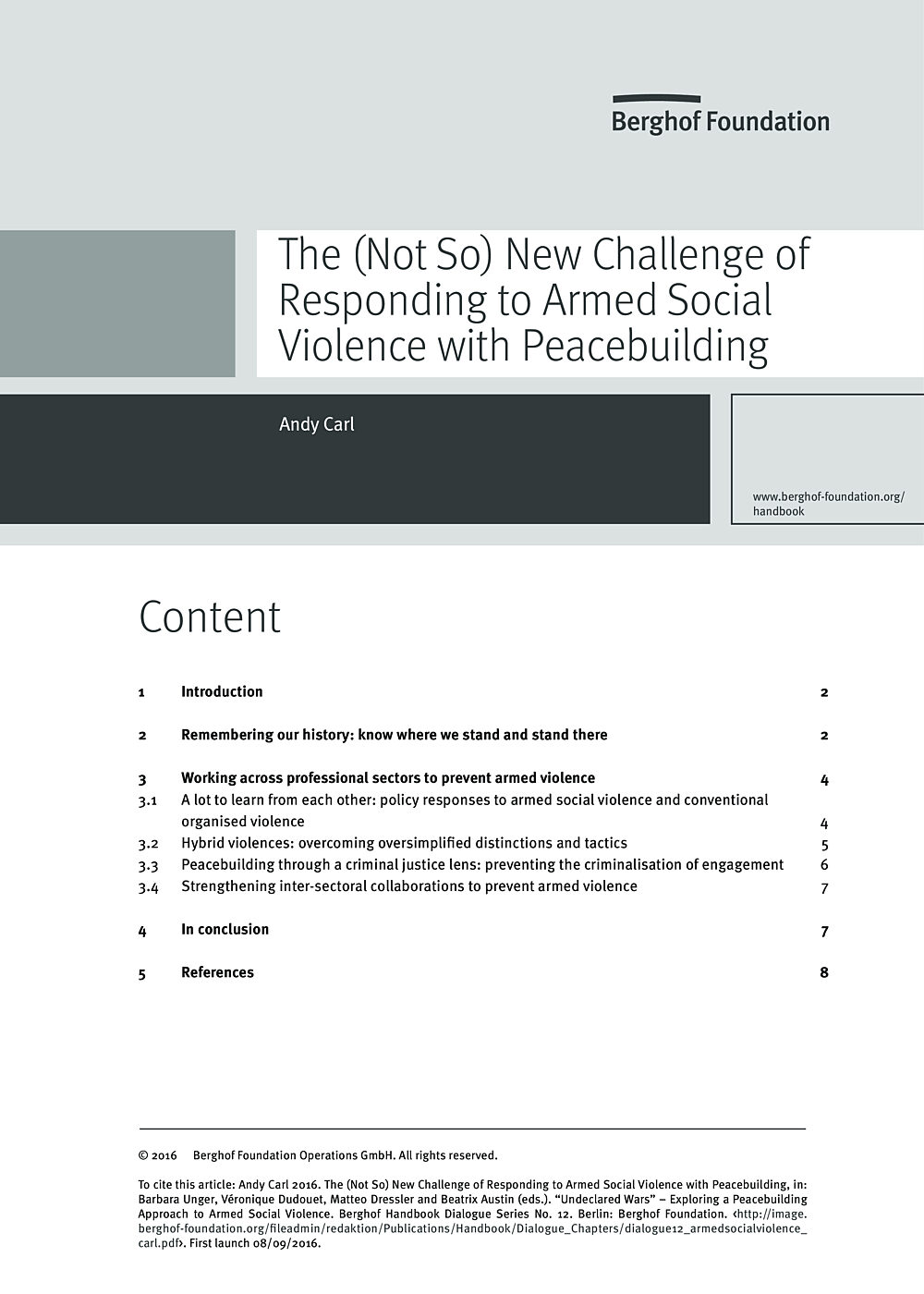
The (Not So) New Challenge of Responding to Armed Social Violence with PeacebuildingBerghof Handbook Dialogue Series No. 12 - comment
Reading the excellent article by Bernardo Arévalo de León and Ana Glenda Tager on armed social violence felt like a long walk in the mountains: challenging, invigorating – and definitely worth the effort. The three strands entwined in their rigorous discourse assert that armed social violence (including criminal and inter-communal violence) is a phenomenon distinct from conventional armed violence and different again from individual and terrorist violence – although they choose not to say much about these latter spheres. The second strand in their argument is that our developing field of peacebuilding has relevant experiences to offer to complement traditional criminal justice responses. Then they move to a call for a different strategic, systemic and operational response, one that fundamentally engages with the complex natures of social and conventional armed conflicts.
- Year2016
- Author(s)Andy Carl
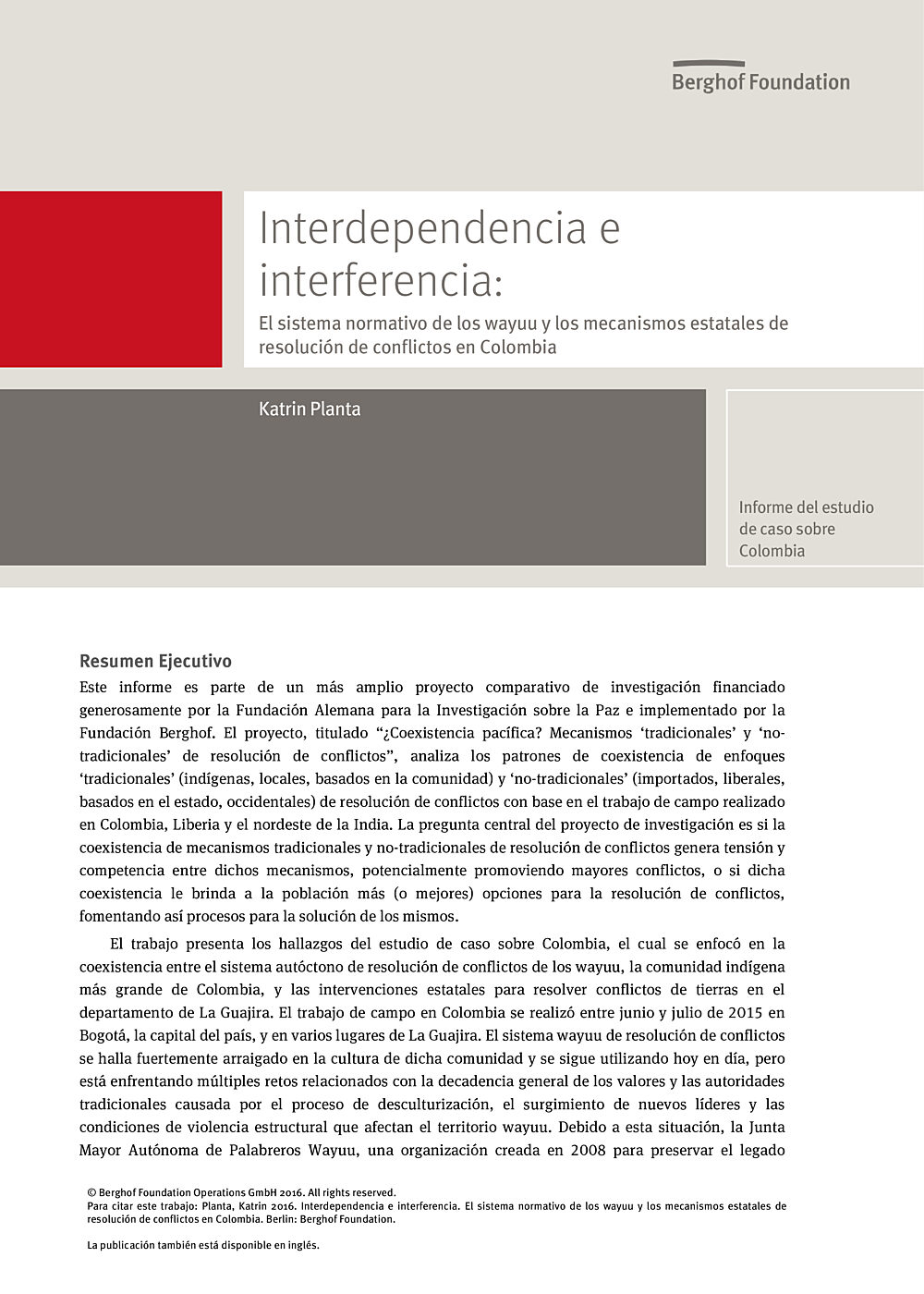
Interdependencia e interferenciaEl sistema normativo de los wayuu y los mecanismos estatales de resolución de conflictos en Colombia (Estudio de caso)
Este informe es parte de un más amplio proyecto comparativo de investigación financiado generosamente por la Fundación Alemana para la Investigación sobre la Paz e implementado por la Fundación Berghof. El proyecto, titulado “¿Coexistencia pacífica? Mecanismos ‘tradicionales’ y ‘no-tradicionales’ de resolución de conflictos”, analiza los patrones de coexistencia de enfoques ‘tradicionales’ (indígenas, locales, basados en la comunidad) y ‘no-tradicionales’ (importados, liberales, basados en el estado, occidentales) de resolución de conflictos con base en el trabajo de campo realizado en Colombia, Liberia y el nordeste de la India.
- Year2016
- Author(s)Katrin Planta
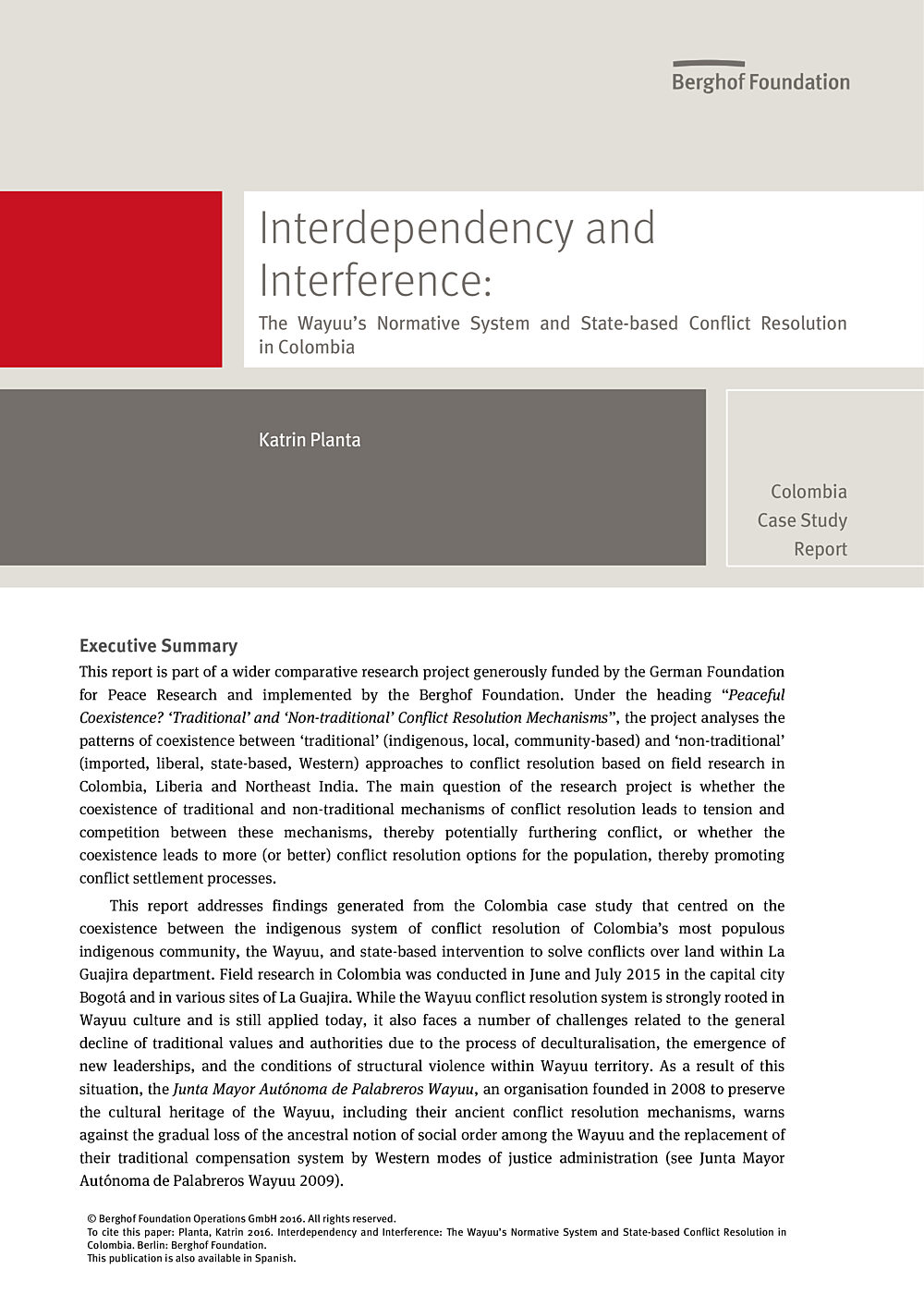
Interdependency and InterferenceThe Wayuu’s Normative System and State-based Conflict Resolution in Colombia (Case Study)
This report is part of a wider comparative research project on “Peaceful Coexistence? ‘Traditional’ and ‘Non-traditional’ Conflict Resolution Mechanisms” to analyze the patterns of coexistence between ‘traditional’ (indigenous, local, community-based) and ‘non-traditional’ (imported, liberal, state-based, Western) approaches to conflict resolution. It addresses findings on the coexistence between the indigenous system of conflict resolution of Colombia’s most populous indigenous community, the Wayuu, and state-based intervention to solve conflicts over land within La Guajira department.
- Year2016
- Author(s)Katrin Planta
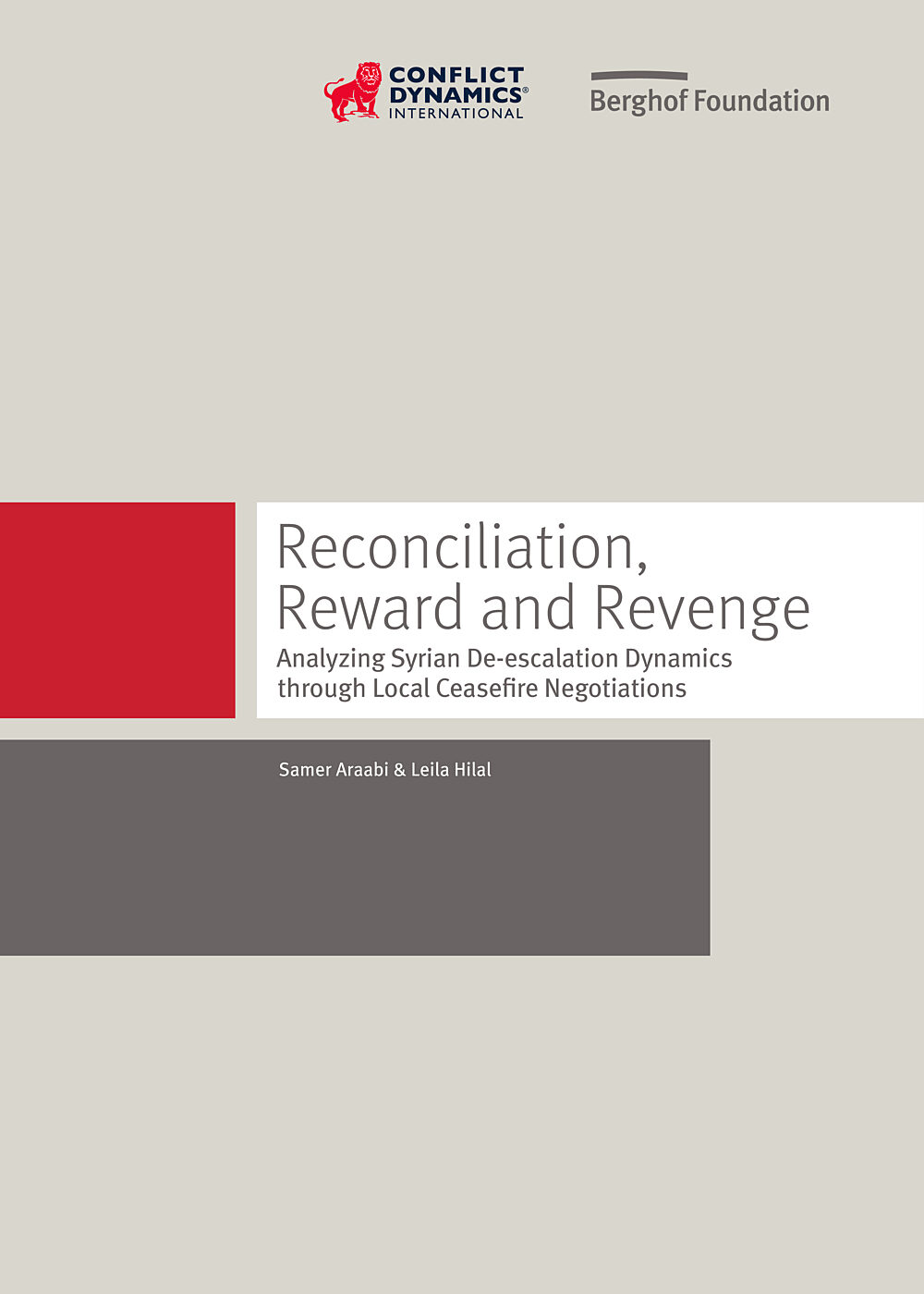
Reconciliation, Reward, and RevengeAnalyzing Syrian De-Escalation Dynamics through Local Ceasefire Negotiations (Berghof Grantee Publication)
Samer Araabi’s and Leila Hilal’s innovative report focuses on one prominent framework for local mediation and de-escalation in Syria: local ceasefire negotiations. Based on research conducted between mid-2014 and March 2016, their report presents four in-depth cases of ceasefire negotiations that have taken place inside Syria since 2012. It explains the environment in which these negotiations occurred and offers observations on the obstacles and shortcomings they faced.
- Year2016
- Author(s)Samer Araabi, Leila Hilal
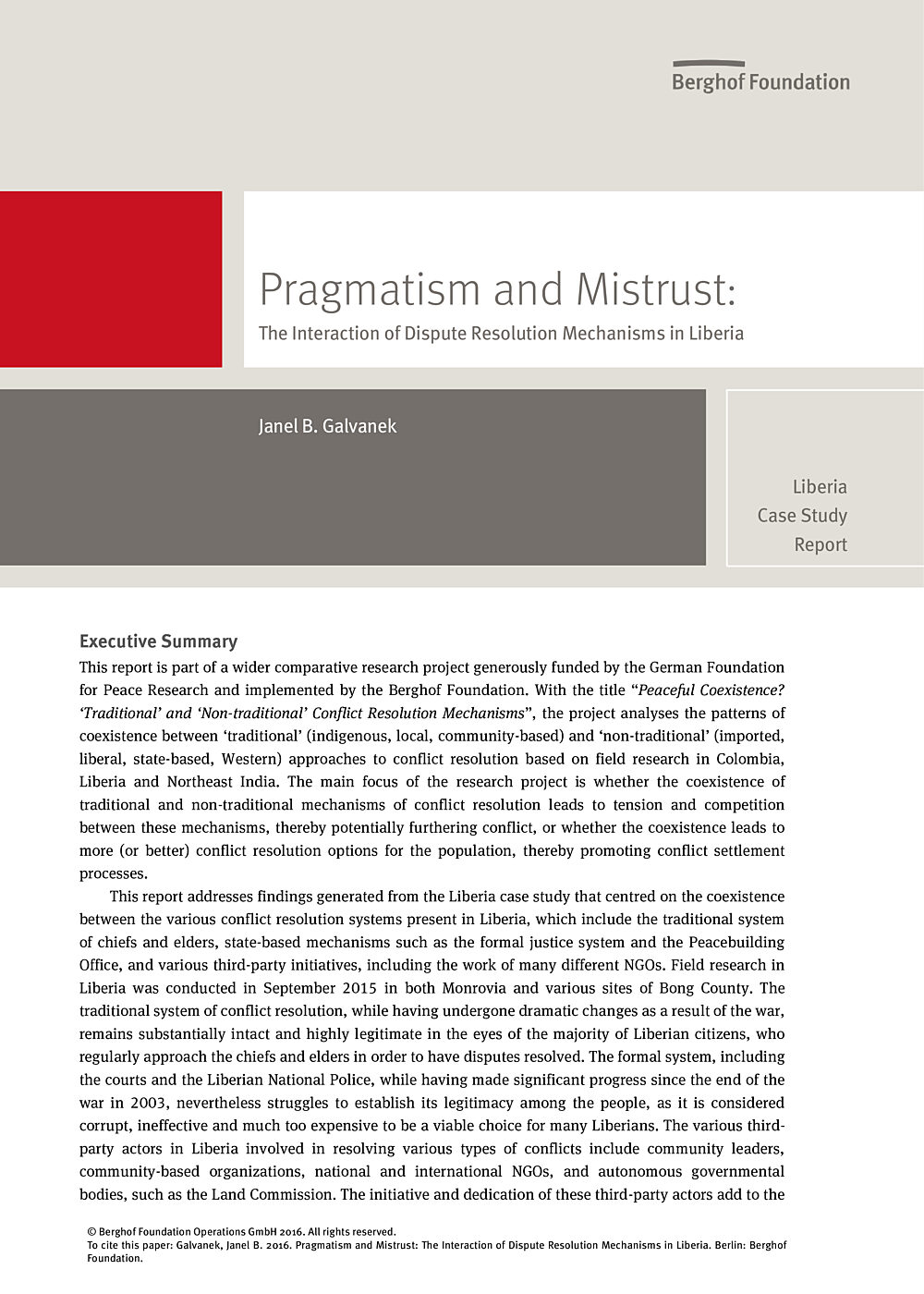
Pragmatism and MistrustThe Interaction of Dispute Resolution Mechanisms in Liberia (Case Study)
This report addresses findings generated from the Liberia case study on the coexistence of various conflict resolution systems in Liberia. Besides the traditional system of chiefs and elders, there are state-based mechanisms such as the formal justice system and the Peacebuilding Office, and various third-party initiatives, including the work of many different NGOs.
The study comes to the conclusion that the interaction and even cooperation of conflict resolution mechanisms in Liberia is happening on a massive scale, and provides recommendations on how this cooperation could be significantly improved.
- Year2016
- Author(s)Janel B. Galvanek
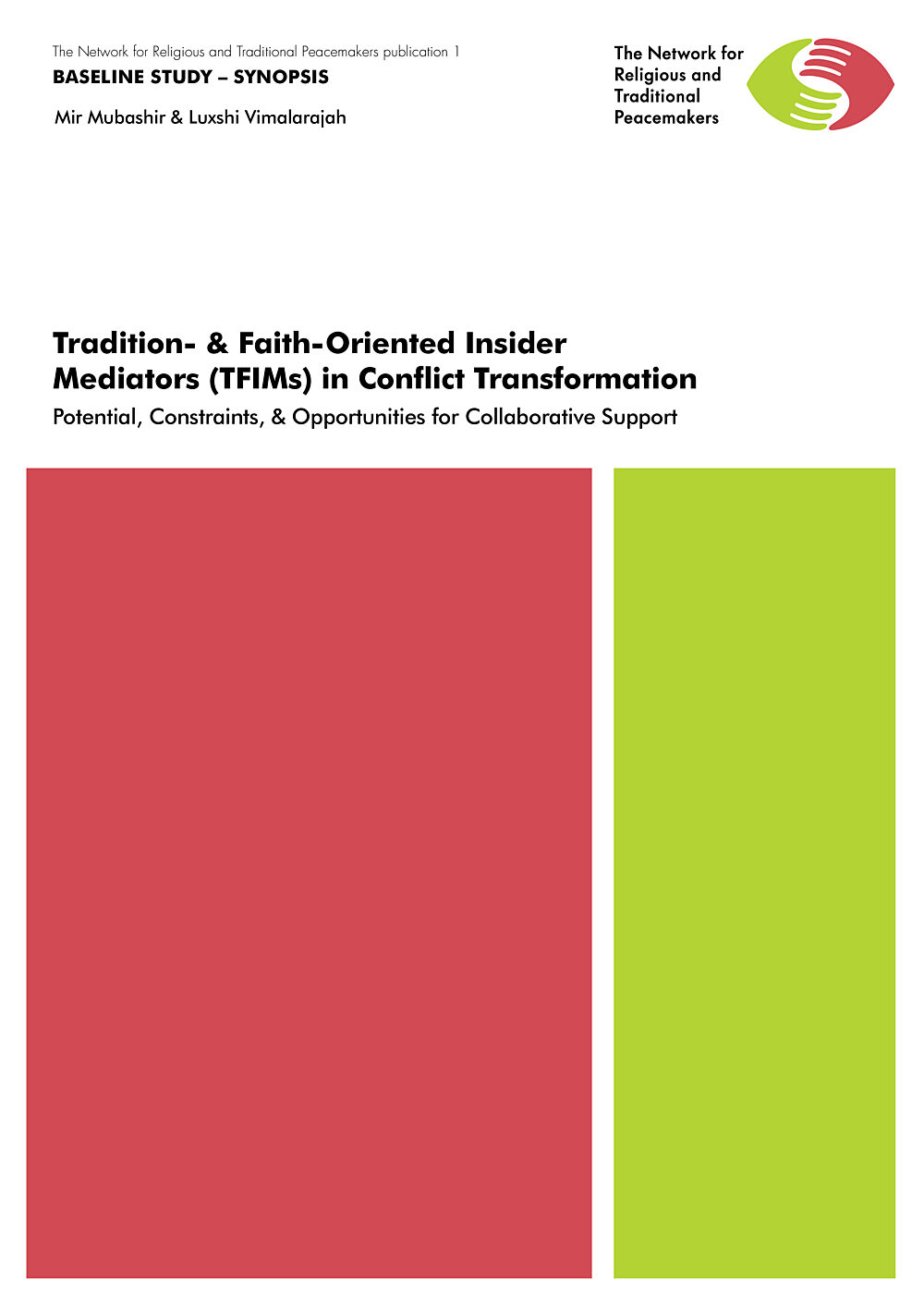
Tradition- & Faith-Oriented Insider Mediators (TFIMs) in Conflict TransformationPotential, Constraints, & Opportunities for Collaborative Support (Baseline Study: Synopsis)
On the basis of empirical knowledge acquired through case studies in Myanmar (Burma), Southern Thailand, Lebanon, Colombia, Kenya and Mali, this study conceptualises and contextualises a specific set of religious and traditional peacemakers as tradition- & faith-oriented insider mediators (TFIMs). In considering their peace mediation roles, potential and the constraints under which they work, it also reflects on the opportunities for collaborative support linking various actors within conflict contexts.
- Year2016
- Author(s)Mir Mubashir, Luxshi Vimalarajah